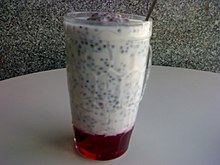Falooda

Falooda with kulfi, rose syrup, and basil seeds
|
|
| Course | Beverage |
|---|---|
| Place of origin | Indian Subcontinent |
| Region or state | India, Nepal, Pakistan, Bangladesh and Sri Lanka |
| Main ingredients | Milk, rose syrup, vermicelli, sweet basil |
| |
|
Falooda (Hindi: फ़लूदा) (Urdu: فالودہ) (Bengali: ফালুদা) (also Faluda), is a cold dessert popular in the Indian subcontinent. Traditionally it is made from mixing rose syrup, vermicelli, sweet basil (sabza/takmaria) seeds, and pieces of jelly with milk, often topped off with a scoop of ice cream. The vermicelli used for preparing falooda is made from wheat,arrowroot, cornstarch, or sago.
The origins of falooda go back to Persia, where a similar dessert faloodeh was popular. The dessert came to India with the many Muslim merchants and dynasties that settled in India.
The present form of falooda was developed by the Mughal empire and spread with its many conquests. Muslim rulers who succeeded from the Mughals patronized the dessert with their own adaptations, specifically in Hyderabad Deccan and the Carnatic.
Today there are many versions of falooda. Some are made without noodles and blended with fruit. One of the Indian versions consists of kulfi, translucent wheat-starch noodles, and flavoured syrup.
In idiomatic Hindustani, falooda is sometimes used as a reference to something that has been shredded, which is an allusion to the vermicelli noodles. For example, someone who falls into disrepute might say that his or her izzat (honour) has been turned to falooda (इज़्ज़त का फ़लूदा, عزت کا فالودہ, izzat ka falooda), which is roughly equivalent to saying "my reputation is shot."
...
Wikipedia
